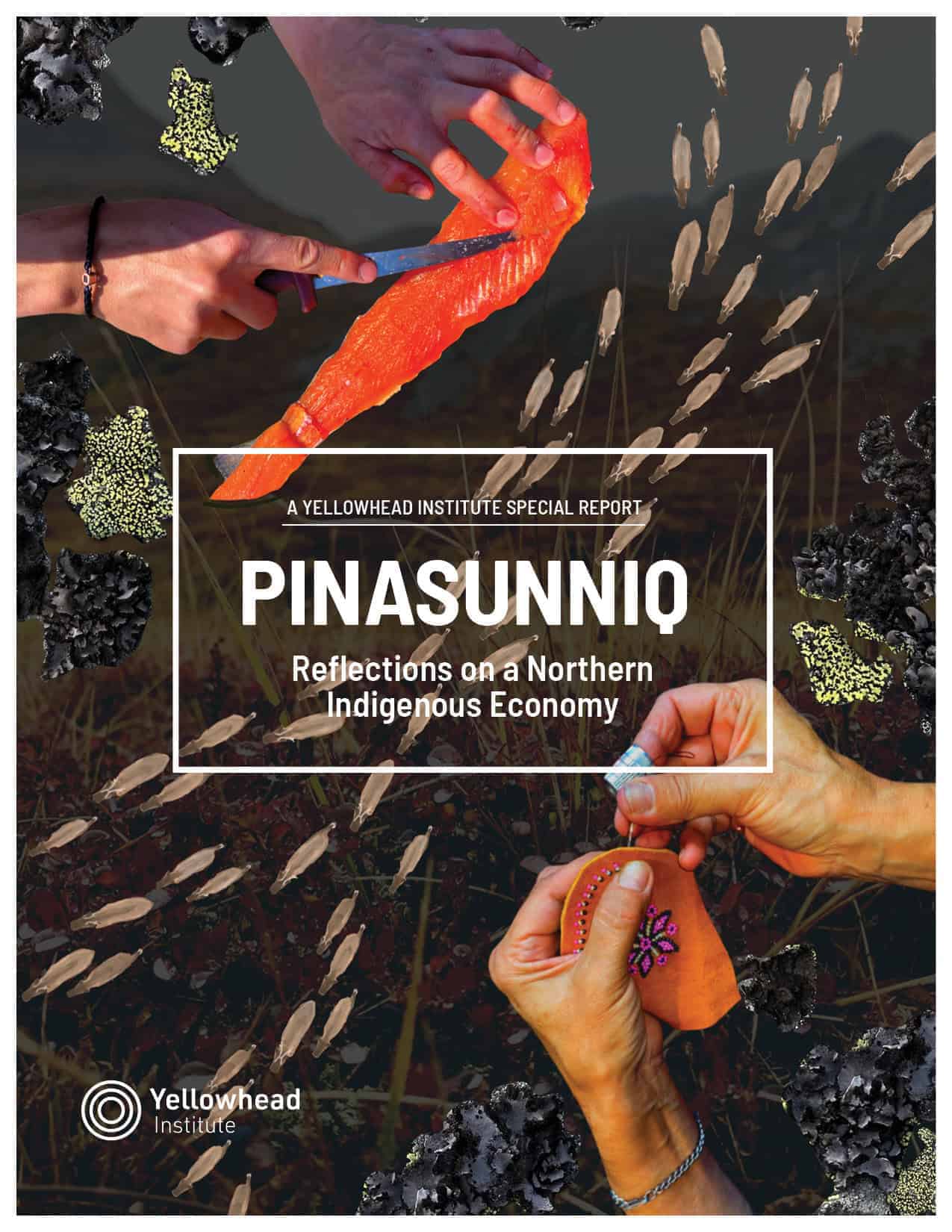- About
- Research
-
-
- Special Reports & Features
- Braiding Accountability: A Ten-Year Review of the TRC’s Healthcare Calls to Action
- Buried Burdens: The True Costs of Liquified Natural Gas (LNG) Ownership
- Pretendians and Publications: The Problem and Solutions to Redface Research
- Pinasunniq: Reflections on a Northern Indigenous Economy
- From Risk to Resilience: Indigenous Alternatives to Climate Risk Assessment in Canada
- Twenty-Five Years of Gladue: Indigenous ‘Over-Incarceration’ & the Failure of the Criminal Justice System on the Grand River
- Calls to Action Accountability: A 2023 Status Update on Reconciliation
- View all reports.
- Special Reports & Features
-
-
- Yellowhead School
-
- The Treaty Map
- LIBRARY
- Submissions
- Donate
Pinasunniq: Reflections on a Northern Indigenous Economy offers a vision of Inuit economic self-determination.
It challenges the “common sense” Northern economic models that have historically excluded Inuit voices and continue to erase Inuit economic activity. Through economic analysis, narrative, and advocacy, the report asks critical questions about the benefits of government-led policy and approaches of industry. In contrast, it offers examples of Inuit-centered economic frameworks in practice today that prioritize sustainability, reciprocity, and care.
- Part 01 reviews the current landscape, reflecting on systemic barriers to Inuit-led development.
- Part 02 addresses traditional economic activities, particularly hunting, harvesting, and food sovereignty, emphasizing the role of Indigenous knowledge.
- Part 03 explores economic diversity through the arts and care-based economies, with perspectives on healing, meaningful work, and reconciliation.
Ultimately, this edited report is not just an analysis but a call to action to envision and act upon a future where Inuit have the authority to shape their economy in ways that foster cultural revitalization and community well-being. Pinasunniq demonstrates how Inuit leadership in economic discourse can shift us toward a path for transformative change rooted in self-determination and aligning with Inuit values.
KEY QUESTIONS
- What is the relationship between Inuit self-determination and prosperity in the North?
- Nunavut is one of the fastest growing economies in Canada but socio-economic indicators for Inuit are declining — how can this be explained?
- How can hunting, conservation, arts and care inform a holistic, diverse vision of a Northern economy?
- Do mining and related industrial activities in Nunavut benefit Inuit?
TABLE OF CONTENTS
PREFACE
Recovering Ourselves through Kaujjajjuk
by Kunuk Inutiq
PART 01 | Contextualizing the Northern Economy
Editors’ Introduction: What is the Northern Economy?
by Kunuk Inutiq, Shari Fox and Hayden King
The Current State of the Northern Economy for Inuit in Nunavut
by Matthias Oschinski
Transformation in the North: Reflections on the Return to a Holistic Economy
by Siila Watt Cloutier
PART 02 | The Economy of Nuna and Sila
Hunting Education for an Economy of Food
by Janine Lightfoot and Hayden King
Return of the Full-Time Hunter
by Esa Qillaq
Navigating the Turbulent Waters of Fisheries Rights in Nunavut
by Jason Akeearok
Developing a Conservation Economy in the Canadian Arctic
by Richard Paton
PART 03 | The Economy of Arts, Crafts, & Care
Reflections on the Art and Craft Economy in Nunavut
by Barbara Akoak
Decolonial Art and Destructive Economies
by Laakkuluk Williamson Bathory and Kunuk Inutiq
Reflections on Meaningful Work: Working for a Community Organization
by Romani Makkik
CONCLUSION
Re-Imagining Economic Development in Inuit Nunangat by Kunuk Inutiq, Hayden King, & Shari Fox
This report is meant to help generate dialogue on Inuit defined economy, the trajectory of it and, perhaps, reimagine the path. The chapters in this report centre Inuit perspectives on the concept of economic development with a focus on the hunting economy, arts and economies of care, and community-based efforts that renew and build Inuit values and connections. Meanwhile, it challenges the status quo of resource development, which offers few clear benefits to Inuit but significant threats to Inuit ways of life and the land itself. The report's authors have reflected several essential and overlooked themes in the discussion on a Northern Indigenous economy.
- - editors, kunuk inutiq, hayden king and shari fox

